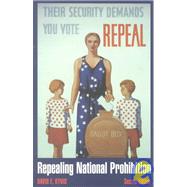Enjoying wide public support at first, upheld by both federal and state governments, and, most importantly, embedded in the Constitution, the Eighteenth Amendment seemed impervious to change. Prohibition repeal required nothing short of a political earthquake -- a near-total reversal of congressional and state dry law endorsement, more than simply shifts in ethnic power and cultural taste.
Employing previously unexamined archival evidence, Kyvig calls attention to a little-known but broad-based bipartisan movement led by the Association Against the Prohibition Amendment and the Women's Organization for National Prohibition Reform. These organizations and their









